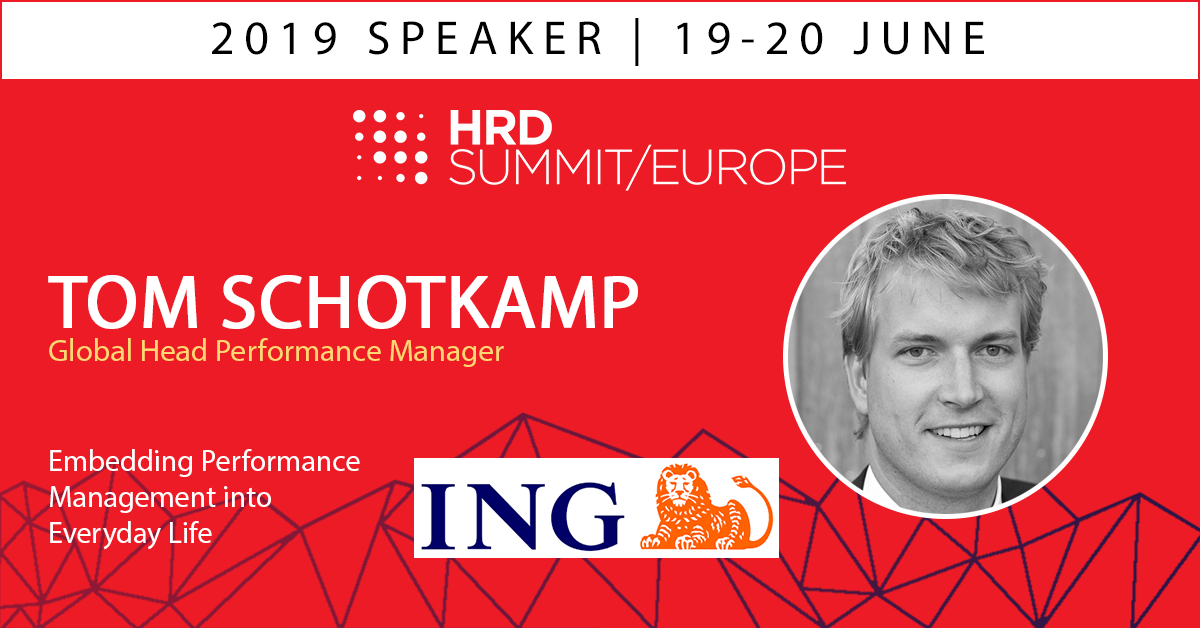Embedding performance management into everyday life: Tom Schotkamp, Global Head Performance Management, ING
- 6 Min Read
T.J. Schotkamp, Global Head Performance Management, ING, is an expert in feedback and employee performance. Ahead of his appearance at the HRD Summit EU, June 19th-20th, RAI Amsterdam, he sat down with HRD Connect to discuss the changing face of feedback, and why formal moments still have a place in its future.
- Author: Michael Hocking
- Date published: May 16, 2019
- Categories

Think about your last performance review. Did you feel like it was a constructive conversation, or a rigid formality, got out of the way and forgotten about?
“True intuitive expertise is learned from prolonged experience with good feedback on mistakes”, said psychologist and economist Daniel Kahneman. But what defines ‘good feedback’, and how can it be attained?
Many organisations are doing away with the formal approach to performance management, engaging in new and innovative ways to help their employees to grow. But are they throwing the baby out with the bathwater?
T.J. Schotkamp, Global Head Performance Management, ING, is an expert in feedback and employee performance. Ahead of his appearance at the HRD Summit EU, June 19th-20th, RAI Amsterdam, he sat down with HRD Connect to discuss the changing face of feedback, and why formal moments still have a place in its future.
What are organizations getting wrong when it comes to feedback?
One of the things that most organisations are getting wrong is that they’re seeing feedback as an event or as data – whether that’s your feedback conversation, or some feedback written down somewhere. However, I think it’s, it’s more of a capability. In other words, it’s a behaviour of managers, of people leading others, rather than the results of a meeting or a piece of data.
By seeing it as a capability, resulting in behaviour that can be changed, it means that you need to look at all kinds of triggers to drive that behaviour, beyond simply implementing a new performance management cycle. Now you need to understand how to drive behaviour, which means looking at awareness, capabilities, processes, systems, incentives – the whole shebang, if you will. There are all kinds of tools to help you do this, but, in the end, it’s the manager capability that will make a difference.
What’s the purpose of a ‘graduated’ approach to performance management?
For me, there’s several types of conversations to help drive performance. Management used to be very much about formal moments of evaluation, resulting in a conversation at the beginning of the year and one at the end. On the other hand, there are continuous conversations, the conversations that people need to have about all kinds of individual ‘HR’ topics.. My view is that the way forward will be a blended approach of those two things, a balance of informal, frequent conversations, and less frequent formal meetings.
How can a continuous conversation, in terms of feedback, improve employee performance?
I would almost say that it’s the other way around. I don’t believe you can improve performance without continuous conversation. How can having one conversation a year improve the performance of an individual? To improve the performance of an individual, you need to build and show real interest in their development, show you’re committed to that, and I don’t believe that as a manager, you can show commitment by only having one conversation. Keeping your feedback in a box all year isn’t the best way of bringing it to life and helping your people to improve. People are willing to act on feedback if they own it, and I think a prerequisite for that is having a safe environment where people feel good about giving and acting on feedback. I don’t think that, to my point, could happen without a good frequent conversation.
What role is technology playing then in the development of performance management?
I think technology is important, but as an enabler, not because it’s the solution. I don’t care if people in my organization actually write the feedback in the system, for me the end goals is that they actually have the conversation. You can have technology and a calendar with events triggered to remind people, and maybe even to force them to have that conversation, but if you’re forcing people to have feedback conversations, then you haven’t achieved the right relationship with your people yet.
The end goal would be that performance management is integrated into the flow of work. So, whatever you’re doing your organization, performance management comes naturally, and is captured as part of your employees’ interaction with one core system that they use every day. This is not where most organizations are; they have one messy system or many different solutions, which means that, for most large organizations today, technology is seen as an administrative burden.
So, I think the first step for most large organizations is not integrating performance management into the flow of work (meaning abandoning systems), as that’s aiming too far in the future, but reducing this burden. Let’s improve the experience and make it more user friendly. I think that’s a natural first step towards integration.
How do you think performance management will transform in the next ten to fifteen years?
I think there’s a trend now for organizations moving away from formal conversations, and even formal ratings, as part of the trend of working in a more agile way. But I do think this trend will settle in the middle or will fade away to certain extent, for a few reasons. Firstly, because those formal moments still have value. They provide transparency to individuals, actually getting a score is something people want to see this and is valuable. They also have consequences. If a bank, for example, implements a bonus or compensation increase, you would rather have a rigorous process to establish a fair comparison between people. Secondly, I think many large organizations don’t have the maturity to do away with formal moments. Basically, people are not talking about performance throughout the year, they are only doing it in formal moments because their manager tells them to do so. If you take those away, they’re not suddenly going to have these conversations all the time. Especially in larger organizations, you need to be realistic about the maturity and capability of your people to do without those formal moments. You’d rather have some formal moments that feel a bit forced, rather than have nothing at all.
Finally, what I see is that organizations underestimate the change effort. Moving from a few formal moments in the year to no formal moments is a huge culture shift, and those things are not easily achieved. These are multi-year journeys, which require not only changing your performance management approach, but also your training, how you communicate with your people, how you incentivize them, and so on. Being a former consultant with large corporates, I see too many organizations underestimate the change effort needed for this kind of change. So, that’s why I believe these trends won’t disappear entirely, but our organizations will settle somewhere in the middle, and not go to the extreme of removing all formal conversations and ratings.
I also think that performance management will be more integrated with other HR practices, and will also become less of an operational discipline, and have more to do with behavioural science. It’s not about how we can use this technology and make it more efficient, but how we can change the behaviour of individuals, and while technology and our processes are one way to steer that, it’s not the only way.









